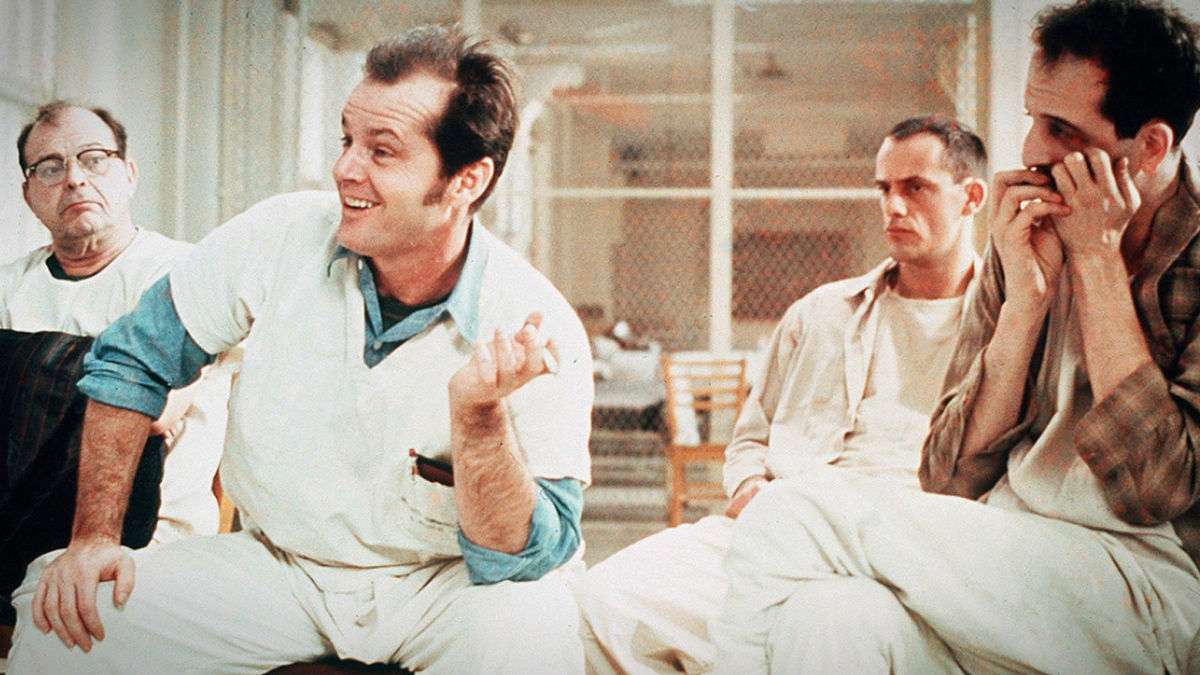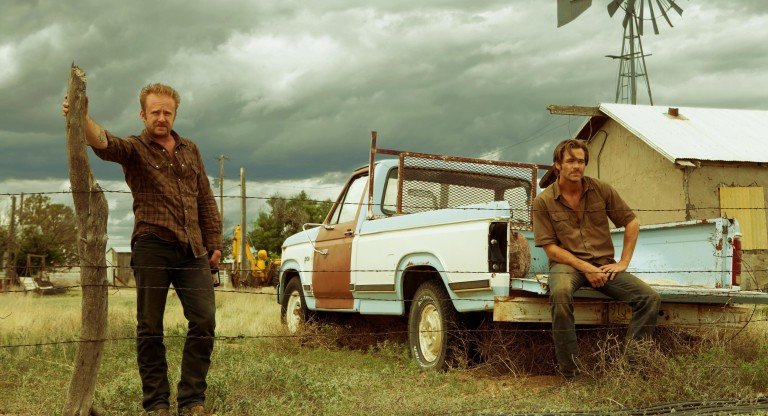“His whole body shakes with the strain as he tries to lift something he knows he can’t lift, something everybody knows he can’t lift. But, for just a second, when we hear the cement grind at our feet, we think, by golly, he might do it.”
In 1962, these were the words with which Chief Bromden, the narrative voice of Ken Kesey’s novel One Flew Over the Cuckoo’s Nest, described what would become one of the most iconic scenes in film history a few years later. One Flew Over the Cuckoo’s Nest, the homonymous adaptation of the novel directed by Milos Forman, remains, more than nearly five decades after its production, one of the most significant films ever made. Released in 1975, it is one of the only three features to win the Big Five at the Oscars ceremony: best picture, best Director, best lead actor, best lead actress, and best-adapted Screenplay.
Although there is no shortage of analytical and interpretive readings of the work, it is still remarkable how, as the years pass, the movie, rather than ae and wither, becomes more and more timeless. What we consequently wonder is: where does the immortality of this work lie? How can it, six decades after the novel’s publication, it’s able to speak with the same universality to the contemporary human being? What makes the film one of the pivotal masterpieces in the history of cinema?
Randle Patrick McMurphy (Jack Nicholson) is a thirty-eight-year-old man serving a prison sentence under charges of aggression, gambling, and sexual assault. Indolent, anti-social, and undisciplined. He is transferred to the Salem State psychiatric hospital to screen his mental condition and ascertain whether his eccentric behavior is due to a mental disorder or simple intolerance of work.
While McMurphy is the film’s protagonist, it is less well known how, in the novel, the main character is not him. Instead, it is the half-Native American giant Chief Bromden, whose point of view the readers share. Bromden, played by Will Sampson, is a mild-mannered man. While he is able to both express himself and understand perfectly, Bromden pretends to be deaf and dumb. The movie’s universality is disclosed in the shift of the viewer’s point of view from Randle’s one to identifying with Bromden. Milos Forman himself has recounted how, upon reading the book, he was surprised to come across a novel that was not simply extraordinary but that “spoke to him.”
Forman does not have a history of psychiatric illness but is a man who experienced firsthand one of the pinnacles of human wickedness. The filmmaker was born in 1932 in Čáslav, in then-Czechoslovakia, where, during the Nazi occupation, both his parents were deported and killed in concentration camps. In Prague, he met Kirk Douglas, then the book’s rights holder. Kirk approached Forman with the idea of collaborating on the adaptation, which was later taken over from Kirk by his son Michael Douglas. In a 2007 interview, the director recounted how he was surprised to revisit his story in the book. Referring to the Douglas family, he shared his thoughts back then:
“Are they so smart to know that this book is about my country? The Communist Party was my Big Nurse! Telling me what to do, telling me what to say, telling me what to think… I know what this book is about.”
In One Flew Over the Cuckoo’s Nest, for Chief and the other institution’s patients, Nurse Ratched (Louise Fletcher) heads the ward and represents the specter of mental illness. It’s a condition associated with their perception of not really being people like others, as much as not being allowed to demand either respect or independence. The rules imposed on them are nothing but the diktats to which a mentally ill person should adhere so as not to be disruptive to the rest of society. The institution represents their (mostly self-diagnosed) inability to integrate with the rest of civilized society, the “nest” in which their mental disorders lead to the creation of rigid laws and rules.
For the director, the interpretation is different. Nurse Ratched embodies the Communist Party. The rules she imposes are authoritarian, and he was subjected to controlling restrictions during his life in Czechoslovakia, whereas the institution epitomizes the country itself. The universality of Milos Forman’s movie stems from the idea that each person has “his own” Big Nurse. Nurse Ratched’s character incarnates everything that is limiting and oppressive and represses the individual freedom of each one of us. An enslaving element of our life that we would wish to uproot and tear apart. As Forman asserts:
“That was the dream of every young man in communist Czechoslovakia: to grab something and throw it through the barbered wire at the border. And go and look at the world!”

Indeed, it is hard to think of even one person who cannot recognize “their own” Big Nurse as much as to understand the desire to discover the world from which she separates us. The message is not limited to external limitations, such as a government, but also to those we place on ourselves. This can be extrapolated from the Chief’s point of view from the original work. A quote from the novel helps to understand this passage:
“Nobody complains about all the fog. I know why now: as bad as it is, you can slip back into it and feel safe. That’s what McMurphy can’t understand, us wanting to be safe. He keeps trying to drag us out of the fog, out into the open where we’d be easy to get at.”
Bromden does not choose life in the hospital because he is forced to, as he has the strength to escape at any time in the story. But because life in an institution is less scary than what it would mean to experience the outside world. This phenomenon is otherwise known as colonization. It implies how the subject accustomed to a law outside himself that imposes limits and boundaries begins to desire to remain subject to that law for life. This concept was also examined in the same period by the intellectual Michel Foucault, who argued how invisible forms of discipline oppress individuals on a broad societal scale, encouraging self-nullification and self-censorship. Indeed, Bromden is hospitalized because of his inability to develop acceptable behaviors in a society where his Native American individuality has no place anymore.
This is where the discussion about the figure of McMurphy opens up. From the time he enters the ward, Randle continually opposes Nurse Ratched. Although he is a positive character and inherently good person, McMurphy is not perfect. He proudly talks about the behaviors for which he has been repeatedly arrested, threatens the staff, and has little regard for the consequences of his actions. On her side, the nurse is flawless according to the conventional social and civilized perspective. Despite being one of the most famous villains in cinema, Nurse Ratched never takes overtly hostile attitudes except in the film’s finale. She provides, without fail, a somewhat understandable justification for her actions, ensuring that her ultimate goal is the good of the patients.
McMurphy is the first person to question her discreet, coercive methods. By continually breaking the rules, Randle demonstrates to the group how there is a standard way to live, or rather how the person who should heal them eventually makes them neurotic and insane. The essay’s opening quote refers to Randle’s failure, after a bet, to lift the heavy sink in the hydrotherapy room. The carelessness with which he reacts to the event (a simple ” At least I tried”) inspires the rest of the ward. They witness how it is not so important to protect themselves from failure, but it is essential to, at least, try to do things we believe possible even when they appear unfeasible. As a result of the episode, the entire ward begins to question the authority of the department head openly.
In particular, Bromden, through feigned deaf-mutism, enacts a personal tacit form of subversion. The inspirational personality of McMurphy is the conduit by which he transmutes this passive subversion into the active desire to leave, finally freeing both Randle and himself. So, what function does Randle play in this story? For Chief, he represents the reclaiming of his individuality and the reappropriation of the title of the person. By not bowing to injustice, he bequeathed Chief his mission of freedom. For the director, he recalls those forces, such as his partisan father, who opposed the oppressions of communism, losing their life. For his compatriots, he might embody heroes of anti-Soviet resistance, such as Jan Palach, who immolated as a manifestation of dissent. For the viewer, he stands for its inspirational forces. In general, he embodies the force of art.
As beautifully described in Ingmar Bergman’s Fanny & Alexander, art is a small world sometimes able to reflect the real world so well that we can understand it a little better. To summarise, that is the beauty of Forman’s film: to show with such empathy the small micro-universe of a ward of an American state institution, to reassert the privilege inherent in human nature not to be determinable, but to have the freedom to choose to construct our paths. Or, in Bromden’s words:
“And then, hiding from the orderlies in the privy, I would take a look at myself in the mirror and wonder how it was possible for someone to succeed in such an enormous feat as that: to be as one is.”


![Ox-Head Village [2022]: ‘NYAFF’ Review – A Predictable yet Gripping Horror with a Grudge-Bearing Ghost](https://79468c92.delivery.rocketcdn.me/wp-content/uploads/2022/07/Ox-Head-Village-2022-768x432.jpg)

![Licorice Pizza [2021] Review: Alana Haim & Cooper Hoffman shine bright in Paul Thomas Anderson’s love letter to coming of age cinema](https://79468c92.delivery.rocketcdn.me/wp-content/uploads/2021/12/Licorice-Pizza-2021-768x384.jpg)


